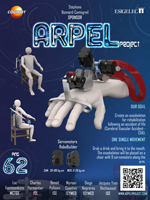 |
||
 |
L'@ctu de l'ESIGELEC - IRSEEM |  |
|
March 2015 - n°8
|
 |
|
The class of 2015 shows off its talent! |
||||||||||||||||||
|
Once again this year, ESIGELEC organised its Poster Day in February, the chance for 2015’s future graduates to display the projects they will be working on for the next year and a half.
66 Engineering Projects responding to companies’ specifications
ESIGELEC’s student engineers work in groups of six on a project occupying the 4th and 5th years of the engineering programme. The projects mainly originate with companies, associations or the school’s research institute. Some originate from the students themselves if the project involves setting up a company.
The task of each team is to :
The Poster Day particularly singled out the project for an exoskeleton of an arm for rehabilitation, sponsored by COGIBOT
 The Poster Day is the chance for students to show their Engineering Project (Projet Ingénieur : PING) to the staff of ESIGELEC and its Research Institute, to the representatives of sponsoring companies and to associations. Visitors are asked to vote for the public prize for the best poster. Among the selection criteria is the graphic design, but also the capacity of the students to make their work comprehensible to all. Each teaching department at the school also gives a prize for the best project, together with a Sustainable Development prize and an Innovation prize.
The winner of the Public Prize and the Innovation Prize this year is the Engineering Project n° 62: « ARPEL project », exoskeleton of an arm for rehabilitation.  Conducted by Luc Vansteenkiste, Charles Parmentier, Benoit Pyllioen, Jacques Yves Rechaussat, Myriam Coantiec and Diego Negreros.
Luc, the Project Manager, wanted to « thank all the teachers who helped us and our sponsor Cogibot, without whom we would not have been able to make the exoskeleton ». Stéphane Bonnard-Cantegreil, the project sponsor from Cogibot : « The idea of the Post-Traumatic Rehabilitation Assistant Via a Light Exoskeleton (in French, ARPEL) comes from my childhood. I would have liked to help my disabled brother to move around more easily by using a mechanical system which, I didn’t know at the time, would later become a rehabilitation exoskeleton. I am happy that this project has attracted so many willing helpers and that the investment in PING 62 lived up to my expectations. I would like to thank the ESIGELEC supervisors for their commitment to the success of the project. I hope that we will be able to carry this enthusiasm over to PING 47 in the next two years. The objective of ARPEL V2 will be to create the user interface for the physiotherapist to make sure the patient can do the best rehabilitation exercises. The project is obviously complicated; embedded systems with a feedback of information, programming of communication software and mechanically controlled assistance are the strong points of this project. Our company, COGIBOT, is specialised in educational robotics. Working on a project such as ARPEL helps to show that the SAM and ROBOBUILDER (KO) servo-motors can meet R&D requirements ». The Sustainable Development Prize went to PING n° 86: « Electric Vehicle & Smart Grid Interaction ».  Conducted by Mamadou Yaklam Diagne, Maguatte Bo, Jeanne Thérèse Badiane, Roussel Hervé Ndjomi Gwewo, Jean Philippe Sarr and Alassane Abou Sow. |
||||||||||||||||||
|
||||||||||||||||||
|
|
||||||||||||||||||


